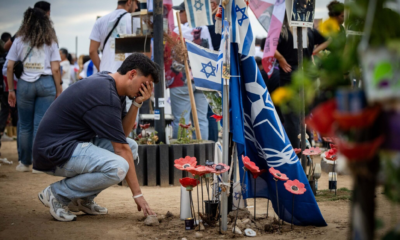
Israel

SA-based expert joins Israel’s 7 October legal team
“I remember checking my phone at 11:00 on 7 October to find 54 unread messages from my closest friends and family in Israel,” recalls Michalya Schonwald Moss. Today, she’s the chief advancement officer of October 7 Justice Without Borders, a non-profit organisation devoted to the legal representation of survivors, murdered victims, hostages, and their families.
“I was in a state of shock,” she said, the heartache still in her voice, “but I managed to maintain contact with my niece who was hiding in a safe room on Kibbutz Be’eri, where violent atrocities were taking place around her. It was horrifying to know that she was amidst the chaos, but news channels allowed me to share information with her about what was going on around her while she remained in hiding. It was only at midnight that I eventually got confirmation of her safe evacuation.”
Schonwald Moss was emotionally shattered by the events of that day. She felt so far away from home, having made aliya from America at the age of 13 and living in Israel for most of her life before moving to South Africa in 2009.
“During the week following the attacks, I absorbed whatever news coverage I possibly could. I watched endless hours of footage of abductions and barbaric human rights violations. My heart broke that day. I was so overwhelmed by grief that I got physically ill with pneumonia.”
While Schonwald Moss regained her strength, her desire to help grew stronger too.
“I kept asking myself how I could lead through these dark and troubled times. I had no answers.”
Her education at Colombia University, with a master’s degree in international development from the University of the Witwatersrand, had given her 20 years of experience in peace and conflict mediation. Her work placed her in many roles across the United States and Israel, where she built a vast knowledge of strategic partnership building, multi-sector collaboration management, and philanthropic advisory services in the social-justice sector. But Schonwald Moss still couldn’t find her place in all the mess.
“It was a tough challenge to find my focus, especially being an American Israeli Jew living in South Africa. Not only was my heart in Israel, but I felt vilified here. When being a Jew equates to being a Zionist, to being a Nazi, I felt an angry sense of betrayal,” she says.
At the end of February, Schonwald Moss was invited to Jerusalem by the World Zionist Organization to attend the first global leadership conference post-7 October. More than 500 leaders, community heads, and activists arrived to map the challenges facing Jewish people in Israel and in the diaspora.
“I wanted to find out how I could help lead in South Africa, a country known to be one of the strongest and most Zionist communities in the diaspora, now facing some of the strongest anti-Israel sentiment by our own government.
“Jewish leaders from all over the world expressed similar feelings of insecurity, complete disempowerment, abandonment, and anxiety. As leaders of the diaspora, we realised we needed to come together and strategise,” she says.
Soon after attorney Yael Vias Gvirsman founded October 7 Justice Without Borders in March, she invited Schonwald Moss to join the initiative. That’s when she knew she had finally found her fit.
The goal of the registered nongovernmental organisation based in Tel Aviv is to ensure that any victim of 7 October atrocities receives free pro-bono legal representation and strategic litigation. Vias Gvirsman’s expertise as an international criminal lawyer representing victims of atrocities worldwide prompted her to start the organisation. She’s also the only Israeli female attorney to advocate successfully at The Hague.
From the very first days after the attack, the initiative accompanied hostages and survivors directly from the field, collecting and preserving evidence and leading a legal front in their name, one that not only preserves their rights, but also their safety.
“Twenty of our 36 missing hostages have been safely liberated,” says Vias Gvirsman. “Unfortunately, some bodies were returned to Israel dead, while other bodies are still being held in Gaza. But there are hostages who are still alive, and we’re waiting for their return home – safely, immediately, and unconditionally.”
The non-profit organisation is representing 262 victims – hostages, survivors, and the estates of the murdered victims – from several kibbutzim and the Nova festival, one of which is the family of murdered hostage Shani Louk.
The initiative was the first to file a complaint on behalf of the victims at the International Criminal Court, and the only one representing victims at The Hague without intermediaries.
“We investigate the truth by working with forensic experts who have collected and preserved evidence in more than 28 crime scenes,” says Schonwald Moss. “Our teams document witness testimonies humanely, collecting all the evidence to prove that the crimes did occur and then we work towards reparation and compensation,” she says.
“We present civil lawsuits against the state, corporate entities, and individuals in order to give direct reparations to victims. We also aim to deal a fatal blow to the funding of terrorist infrastructures in order to ensure that this never happens again,” Schonwald Moss says.
A holistic approach ensures that clients are treated with the utmost sensitivity, with consideration towards the well-being and mental health needs of victims, and the initiative connects them with those resources too.
We have recently marked nine months since the attack on Israel, and hundreds of Israeli protesters blocked highways across the country, demonstrating outside the homes of ministers to incite pressure on the government to reach a hostage deal with Hamas.
The “Day of Disruption” began at 06:29 – the exact time Hamas terrorists launched the first rockets in its deadly surprise attack that triggered war. Since the brutal attacks, 116 of the 251 abducted hostages still remain unaccounted for.










